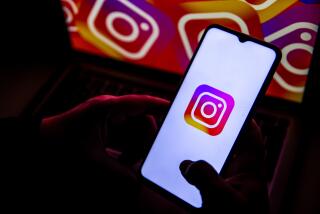In the digital age, breaking up is hard to do
- Share via
It’s Valentine’s Day, and I’m not celebrating. A few weeks ago my fiancee and I broke up.
It was a difficult breakup, so I immediately stopped following her on Facebook, Twitter and Instagram, and deleted her name from my iPhone address book.
I thought that would be enough to disconnect her from my digital life. But I’m finding out — as many others have in the age of smartphones and social networks — that connecting is easy, but severing ties online is nearly impossible.
Take even the basic task of doing an Internet search. When I type in the letter “T” into my Web browser, Google suggests Twitter and just below that it lists my former fiancee’s Twitter handle.
Other social media platforms serve up similar uncomfortable reminders. It feels like no matter what I do, I run into her online.
Ka-Yuet Liu, a sociologist who studies social networks at UCLA, said I’m not alone. Social networks have taken away some of the controls that we have over our social lives.
As soon as we post information, it is forever on the Internet somewhere, she said. That means you can’t undo or wipe away a memory by merely pressing the delete button.
Adrian Miller, who runs a Studio City Web branding firm, recently ended a relationship with his longtime girlfriend, leading him to swear off social media so that he can focus his attention on other things.
“I just have not looked at Facebook, Twitter, Instagram or any of that, and I’m not going to for another, at least, month,” the Los Feliz resident said. “Do something else. Go to a movie, get in the community. At the end of the day, you cannot let social media dictate you or your life.”
Miller, 43, said that disconnecting is tough because many people rely on the Internet to manage a great deal of their social lives, so they share too much personal information.
He has kept busy working on HeartBreakSecrets.com, a new website he created that gives users who are dealing with breakups a place to go to write about their experiences anonymously.
“Just bleed your heart, tell your story,” he said. “Because you don’t want to do that on your Facebook page.”
But it’s not just romantic breakups that can be distressing when it comes to disconnecting.
A few years back, Miller left a job under less than friendly terms. In the years before social networking, he would have naturally stopped seeing his former colleagues and hearing about them unless he sought them out. But because he was friends with them on Facebook, Miller said he had to manually delete all of them, one by one.
“I just didn’t want to deal with any of those people anymore,” he said. “I don’t want to see their respective timelines and feeds.”
Or in my case, efforts by social networks to make it easier for me to connect has made it impossible for me to disconnect from my former fiancee.
After my breakup, when I typed “V” (the initial of my former fiancee’s first name) into the Twitter search feature, her profile was the first suggestion that popped up.
When I use Facebook’s Messenger app, her name is the first suggestion when I want to start a new chat, even though we’re no longer connected on Facebook.
On Spotify, a music streaming service, I was able to delete the playlists I shared with her and unfollow her so I won’t see what she’s listening to. But I have not been able to block her from seeing what I’m enjoying.
On Dropbox, the cloud storage service, are hundreds of photos of us together shot with my phone that it backed up for me automatically, along with countless other photos. I’ve stopped trying to go through them and delete them one by one. Google+ does the same, and it also stores some GIFs, or short slide shows, of my proposal to her. It will be a while before I browse through my photos on either of these services.
We’ve been apart for a few weeks now, but the most recent instance of randomly coming across her on the Web was one that was particularly devastating. It came courtesy of LinkedIn, the social network for professionals.
I logged into LinkedIn because I hadn’t used the service in a while and I had a lot of notifications that needed attention. I went through dozens of connection requests and was feeling very proud of myself for clearing them out. I finished the last request, and that’s when I felt like “Fight Club’s” Tyler Durden had punched me right in the stomach.
“Join V..., Dustin and 313 others who have found people they already know,” the service said, hoping to keep me on its website a little longer.
When I saw her avatar right below that suggestion, LinkedIn nearly brought me to tears.
salvador.rodriguez@latimes.com
Twitter: @sal19
More to Read
Inside the business of entertainment
The Wide Shot brings you news, analysis and insights on everything from streaming wars to production — and what it all means for the future.
You may occasionally receive promotional content from the Los Angeles Times.











